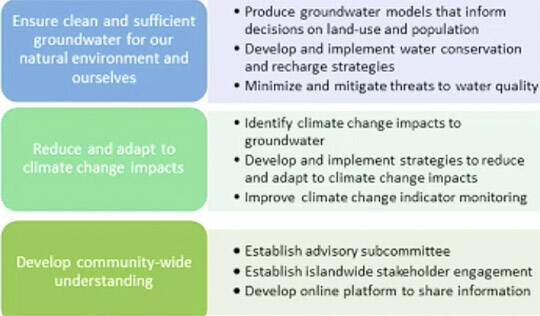Many on the Bainbridge Island City Council agree — it’s the most important issue they will decide—so “citizen science” might be needed.
‘It’s the single-most important decision I can make as a councilmember, to ensure future generations have enough water,” Councilmember Joe Deets said.
The council discussed the city’s Groundwater Management Plan at a recent meeting.
After listening to Public Works director Chris Wierzbicki, councilmembers agreed more data is needed, especially from residents.
When Wierzbicki said people don’t like the city monitoring their wells, Councilmember Michael Pollock said he knows of cities that are robust about getting residents to take part. He said, for example, that it’s easy to monitor stream flow. He said if the community is educated about the importance of the information, “citizen science” could collect needed data.
Councilmember Leslie Schneider said the city could work with schools. “Then parents start paying attention.”
Mayor Brenda Fantroy-Johnson said they really can’t do much without a deep understanding of what’s out there. “A gap analysis is what we need to do.”
Wierzbicki said with the data it could find out which watersheds are best, which can help the city decide where development could go.
Schneider said more innovation is needed. She said if the average resident collected rainfall from their rooftop and stored it they would have enough water for an entire year.
Wierzbicki said more water conservation is needed, adding a majority of water used is for irrigation and landscaping.
Councilmember Jon Quitslund said they need to have a description of resources explaining how one affects the other so everyone is on the same page.
While Wierzbicki’s report says most development in the future will be in Winslow, Quitslund said that may not be the case because a report says more than half of the city’s Buildable Lands are outside downtown in “so-called conservation areas.” He said unless zoning is radically changed there will be growth beyond Winslow.
Councilmember Kirsten Hytopoulos said approving a water plan would be useless if policies aren’t changed to match it. “We need a balanced water budget. What comes out has to go back in.” Another option is to recharge more wastewater, she added.
Regarding policy, Pollock said maintaining surface water flows could be one. To save salmon in perpetuity is another. To say an aquifer cannot drop below a certain level could be a third. All of those things could be monitored.
In introducing the topic, Wierzbicki said they started in 2021 and are about halfway done. They just hired a new consultant in June.
The steps are research to set the foundation, planning to define the problems and strategies to set goals.
They first looked at what BI would be able to handle in the next 100 years. He said the good news is 50% more water would be pumped out of the ground to deal with population increases, but the recharge would be reduced 20% due to climate change. He said the 4-foot rise in sea level would not intrude on freshwater.
When Councilmember Clarence Moriwaki questioned that, Wierzibicki said freshwater near the shoreline is deep enough that there would be no intrusion. “There will be other issues” with higher sea level, “but saltwater in your well may not be one of them.”
The Public Works director added the water plan will not have hard numbers, but will be more theoretical to help with broad land-use policy.
Plan goals include:
•Ensure clean and sufficient groundwater: models inform decisions on land use and population; water conservation and recharge strategies; and minimize threats to water quality.
•Reduce and adapt to climate change; identify impacts to groundwater; develop strategies to reduce climate impacts; and improve indicator monitoring.
•Develop community-wide understanding: establish advisory subcommittee; stakeholder engagement; and online platform.
City manager Blair King said staff will bring back some draft policy goals by late September. It also will return to explain a stream-monitoring program. He plans to keep this on the agenda each month “to focus on this important priority.” The city had hoped to finish this plan by Dec. 31, but now it looks more like the third quarter of 2024.



